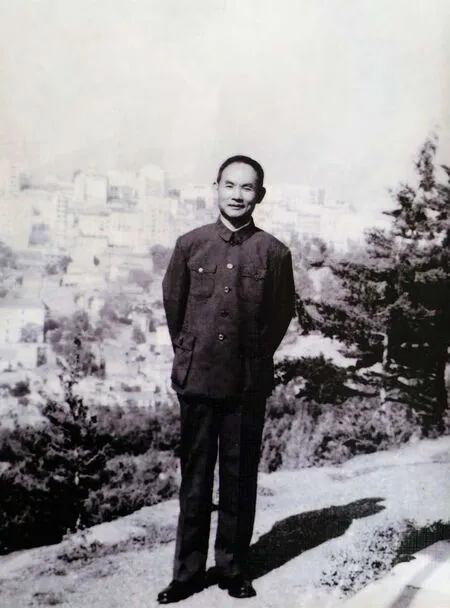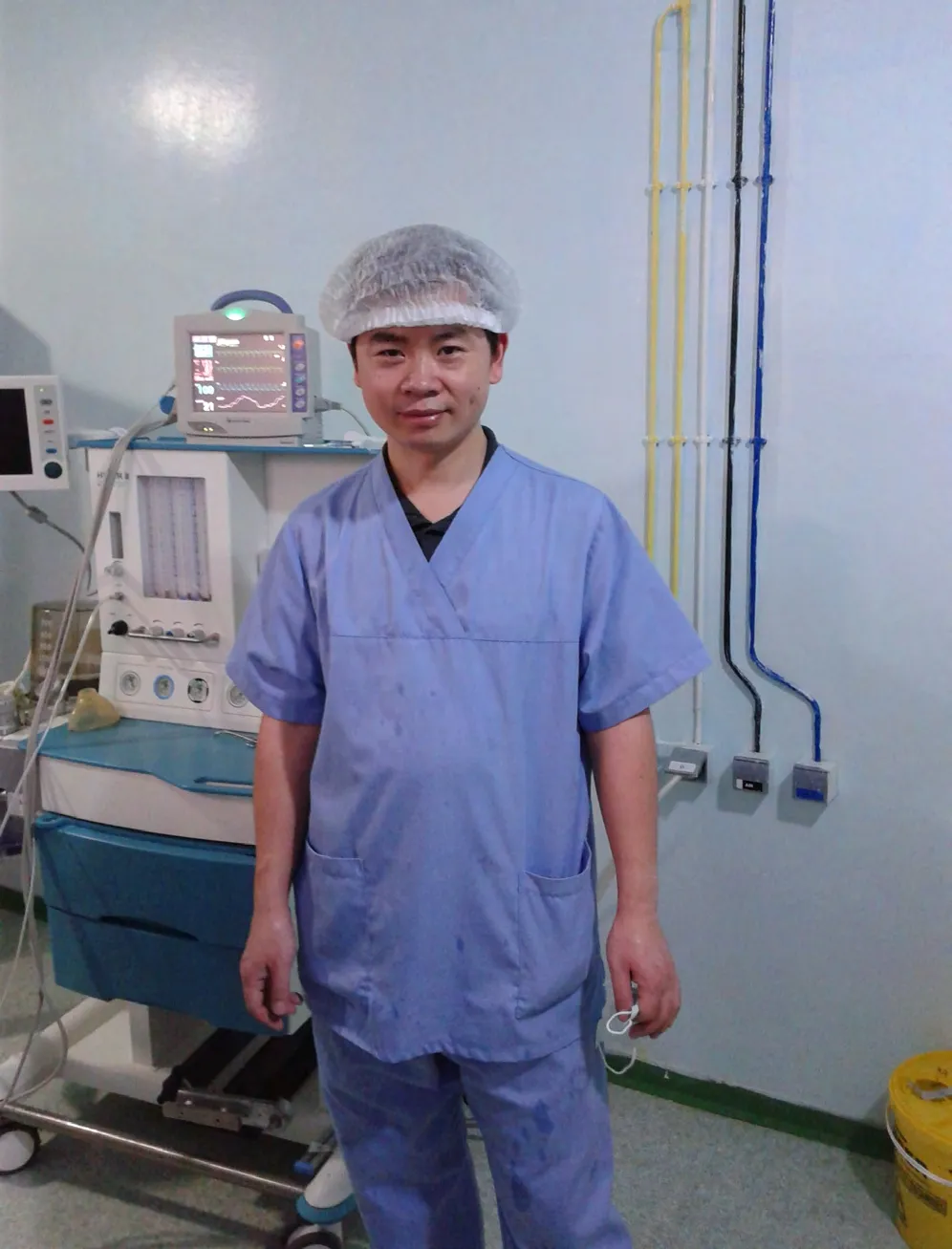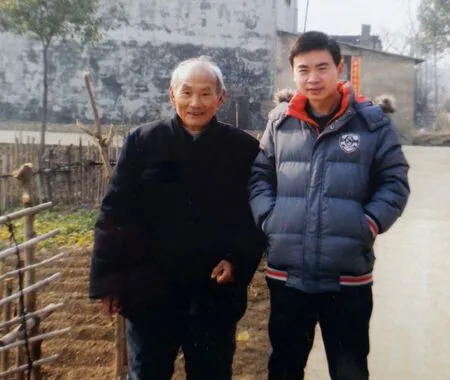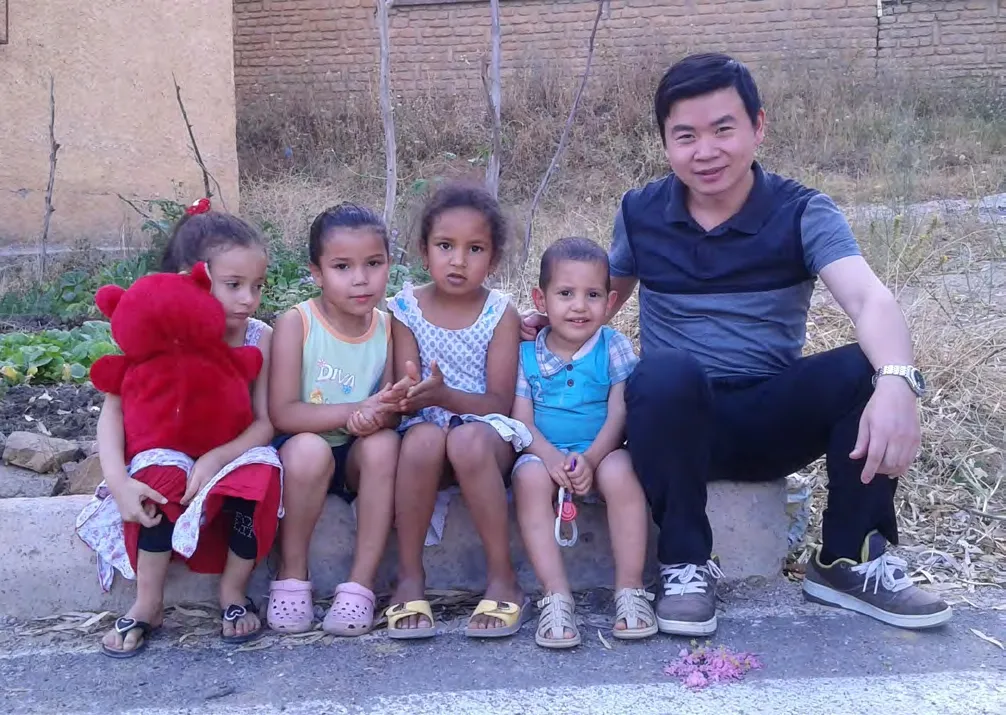Witnessing 40 Years of Friendship Between China and Africa Three Generations’ Friendship with Algeria
By Zhou Zhitao, Zheng Yi, Liu Zhenyu, and Sun Yajun
“My name was given by my grandfather, so I developed a strong relationship with Algeria from birth.” At noon on July 24, our correspondent met Shen Ali outside the operating room of the Anesthesiology Department of the Yingcheng Hospital of TCM in Xiaogan,Hubei Province. The 38-year-old anesthesiologist had just finished his fourth operation of that day,his back soaked with sweat.
Recently, at the promotion event held by the Ministry of Foreign Affairs presenting Central China’s Hubei Province, the story of Shen Ali’s family was told far and wide, as three generations from his family were involved in providing medical assistance to Algeria, as a demonstration of the friendship between the two countries. One interview reported that Shen Ali’s family,which included his grandpa Shen Dongsheng, his uncle Shen Hongxing, and himself,had been participating in the aid program for nearly 40 years since 1979. In total, they had participated in seven medical aid teams from Hubei. With the three generations’ relay assistance to Africa came warmth and love from an ordinary family.
Pride of the Family

沈冬升在援非路上 Shen Dongsheng on the way to Algeria
In Shen Ali’s mobile phone were kept many photos taken by Shen Dongsheng, his grandfather.Though a little faded and yellowing, we can still see how Shen Dongsheng spent his life in Algeria.
In 1979, Shen Dongsheng,an anesthesiologist at the Anesthesiology Department of Xiaogan Central Hospital,was dispatched by the Hubei Provincial Health Planning Commission to Algeria. Far away
from China and feeling homesick,he sent letters to his family almost every month.
Shen Hongxing, Shen Ali’s uncle, still remembered reading the letter to his mother every time they came. Sometimes, a picture of his father was enclosed,revealing scenes of his father working in hospital, or walking in the local streets and farms.At that time, Shen Hongxing lived with his brothers and mother in Baiyang Village in Yingcheng. Photos were still a rarity in the village, and Africa was neither heard of nor seen by any of the locals. So, when the letters arrived, villagers would all swarm into his house and have a look at them, saying, “Old Shen is brilliant. He wins glory for our country and hometown!” The praises from villagers made his family very proud at that time.
“我的名字是爷爷取的,一出生就注定了我和阿尔及利亚的缘分。”7月24日中午,记者在湖北孝感应城市中医院麻醉科手术室外,见到38岁的麻醉科医生沈阿利时,他刚完成当天的第四台手术,衣服后背已经湿透。
近日,湖北全球推介会上,沈阿利一家三代在阿尔及利亚接力从事医疗援助的事迹,作为中非友谊的见证被推介。记者采访了解到,从1979年爷爷沈冬升参与援非,到二叔沈红星,再到沈阿利,沈阿利一家三代援非跨越近40年,共参加7批(次)湖北援非医疗队工作。三代人接力援非背后,是一个普通家庭的温情与大爱。
非洲寄回照片
在沈阿利的手机里,翻拍有很多爷爷沈冬升留下的照片。泛黄模糊的老照片上,依稀能看清沈冬升在阿尔及利亚工作、生活的场景。
1979年,时任孝感市中心医院麻醉科医生的沈冬升,受湖北省卫计委派遣,远赴北非阿尔及利亚。远离故土,思念家人,他几乎每个月都会往家里邮寄家书。
沈阿利的叔叔沈红星回忆,每次都是他负责把信念给母亲听。有时,信里会夹带一张父亲的照片,有医院工作的场景,也有在当地街头、农场的照片。当时,沈红星兄弟三人和母亲住在应城白杨村老家,村里相片并不多见,非洲的样子大家更是没有见过。村里的乡亲们听说沈冬升从非洲寄信回来了,都会围过来看,称赞道:“老沈真厉害,为国争光了!”
沈红星说,听到乡亲们的赞扬,一家人脸上都浮现自豪的笑容。
1980年,正在阿尔及利亚参加援非医疗队工作的沈冬升,得知孙儿出生,便给他取名“沈阿利”。爷爷回国后,经常跟沈阿利讲起自己在阿尔及利亚的经历。“在爷爷的影响下,我从小就立志当一名医生。”沈阿利告诉记者,小时候的他,经常在医院观察护士的工作,身边的小伙伴受伤了,他还能进行简单的包扎。
沙漠自制蒸锅
1987年,孝感市中心医院需要推荐一名湖北援非医疗队的厨师,作为医院主厨的沈红星有些心动,父亲鼓励他:“厨师是医疗队的后勤保障,是援非的重要力量。”
沈红星告诉记者,他被医院推荐过去,因为自己平时做菜的花样比较多,随行的医生们都很开心。

沈红星与当地医生结下深厚友谊Shen Hongxing with his Algerian doctor friends
In 1980, while working in Algeria, Shen Dongsheng got the news of his grandson’s birth and immediately named him Shen Ali,as “Ali” is kind of an abbreviation of Algeria in Chinese. After returning to China, Grandpa often told Shen Ali the stories of his experiences in Algeria. “Under the influence of my grandfather,I decided to become a doctor at an early age.” Shen Ali told us that when he was a child, he often observed how the nurses worked in hospitals. So, when his playmates were injured, he could perform simple medical treatments for them.
Building a Steamer in the Desert
In 1987, Xiaogan Central Hospital was told to send a chef to work for the Hubei Medical Aid Team in Africa. Shen Hongxing, a chef for the hospital at the time, was a little tempted. His father then encouraged him, saying “A chef provides logistics support for the medical team and is very important to the team.”
The hospital then recommended Shen Hongxing to work in Africa. Since he was a good cook who could prepare a variety of dishes, the doctors in the team were all happy with him.
When he arrived in Algeria for the first time, he was inexperienced and didn’t bring many cooking utensils. There was flour but no steamers to make buns. Shen Hongxing made a grid by using wire, and then put the grid on the pan, making it serve as a steamer, which successfully steamed buns. When mutton was available yet hot pots were not, he made it with a rice cooker.

沈红星为客人烹制可口的菜肴Shen Hongxing cooked various delicious dishes for the local friends
初到阿尔及利亚,因为没有经验,带的炊具不够,有面粉却没有蒸锅做包子,沈红星就用钢丝扎成格网,架在锅上蒸包子。有羊肉却没有炊具做火锅,他就用电饭锅改装成火锅。
当地人吃得最多的就是土豆泥和面包,时间一长,许多队员脸颊消瘦。沈红星除了变着花样烹饪土豆、胡萝卜等蔬菜,还抽空在驻地开辟菜园子,种起了小白菜、莴苣、苦瓜。听说离驻地60公里外的水库有淡水鱼,他和年轻队员带着一瓶水和几根黄瓜去捕鱼,大半天就捞起来几百斤大鱼。
1987年至2016年,沈红星先后五次随队奔赴阿尔及利亚。
恩施州中医院的医生谭奎,2010年曾和沈红星一起到阿尔及利亚。据谭奎回忆,沈师傅可以一个星期做早餐不重样,无论队员们什么时候回到驻地,都能吃到热饭菜。曾有一名队员犯了胃病,他每天将熬成糊的稀饭送到这位队员面前,一熬就是几个月。在异国他乡,每逢队员生日,沈师傅都会专门准备一碗手擀长寿面,让队员们倍感温暖。
两年千台手术
不论是小时候,坐在爷爷腿上听他讲医生们在非洲的故事,还是稍大一点,从二叔口中听到在非洲捕鱼、种菜的经历,都让沈阿利萌生了去非洲追随爷爷和二叔脚步的梦想。
2015年2月,沈阿利和来自全省各地的80多名援非医生一起去了阿尔及利亚。沈阿利驻扎在距离首都阿尔及尔300公里的地亚雷特省妇产医院,每天接诊最多的就是产妇。
In Algeria mashed potato and bread were daily meals for the locals. The monotonous diet caused many team members to become pale and thinner. So,while cooking potatoes, carrots,and other vegetables in a variety of ways, Shen Hongxing set up a vegetable garden in the station,where he planted cabbage, lettuce and bitter gourd. Having heard there were fish in the reservoir 60 kilometers away from the station,he decided to go fishing with some young fellows, taking only a bottle of water and a few cucumbers.It was not long before they got hundreds of pounds of big fish.
From 1987 to 2016, Shen Hongxing went to Algeria five times with the medical team.
Tan Kui, a doctor at Enshi Hospital of TCM, went to Algeria with Shen Hongxing in 2010. He remembered that Chef Shen was capable of making a different breakfast every day of the week.Whenever they returned to the station from work, they were always served hot meals. Shen heard a doctor suffering from stomach ailment, so he prepared porridge for him for several months. When celebrating someone’s birthday, Chef Shen would always prepare a bowl of hand-made “longevity noodles,”which offered a bit of warmth to the team members in this foreign land.

刚做完麻醉手术的沈阿利 Shen Ali just finished an anesthesia
More than a Thousand Operations in Two Years
As a child, Shen Ali heard a lot of stories about Chinese doctors in Africa while on his grandfather’s lap. Growing up, he heard more stories from his uncle about his fishing experiences and vegetables grown in Africa. All of these stories had created in Shen Ali a dream of following his grandfather and his uncle’s footsteps to Africa.
In February 2015, Shen Ali went to Algeria with more than 80 doctors from all over the province.He was stationed in Tiaret Provincial Maternity Hospital,which was 300 kilometers from the capital, Algiers. Most of his patients were expectant mothers.

沈阿利和爷爷 Shen Ali with his grandpa Shen Dongsheng
刚到医院不久,沈阿利就碰到一个高危产妇:一名30多岁的妇女在附近一家医院剖宫产后,出现大出血,被紧急转送至地亚雷特省妇产医院。当时这名妇女已经面色苍白,处于休克状态,主治医生研究后决定为她切除子宫。手术前对产妇使用麻醉,种类如何选择、剂量如何控制,都考验着沈阿利。最终,他沉着冷静地参与完成了手术。
当地医生紧缺,尤其是麻醉科医生,更是稀少。工作中,沈阿利常常会跟当地的医生交流分享手术技巧。比如,一种名叫连硬外麻醉的局部麻醉技术,在当地医生看来,操作非常繁琐。沈阿利耐心地分解了手术环节,示范并讲解自己的操作手法,将技术无偿地分享给当地医生,当地医生因此常常把沈阿利和队员们请到家中做客。
“有时候走在医院附近的街上,会遇到很多不认识的人,他们看我是中国医生,就会笑着伸出大拇指。”沈阿利介绍,当地的居民非常热情,听他们说得最多的是“麦丝果果”(非常感谢),经常有家属将亲手做的古斯古斯(当地一种宴请重要客人的特色食品)送到医院,表示谢意。
在援非的两年时间里,沈阿利几乎每天都会遇到危重产妇,最多时一天处理过3例,还有其他医院转过来的妊娠高血压合并子痫、体位综合症等危重患者。他在两年里完成了上千台手术的麻醉,没发生过一起医疗事故。
记者了解到,刚刚回国一年多的沈阿利,已报名参加第26批援非医疗队,他希望能有机会再次踏上非洲那片热土。(沈阿利供图)

沈阿利在阿尔及利亚与当地孩子合影 Shen Ali and local children in Algeria
Shortly after arriving at the hospital, Shen Ali received a high-risk mother: a woman in her 30s who had major bleeding after a cesarean section in a hospital nearby. She was urgently transferred to Tiaret Maternity Hospital. When Shen Ali saw her,the woman was pale and in a state of shock. After consideration and discussions, the attending doctor decided to remove her uterus.Shen Ali was the one responsible for applying anesthesia before surgery, choosing the right type of anesthesia and giving the right dose. With calm and composure,he completed his duty with success.
In Algeria, there was a severe shortage of doctors, especially anesthesiologists. At work, Shen Ali was always happy to exchange surgical skills with local doctors.For example, epidural anesthesia,a local anesthesia technique, was considered very complicated and difficult by local doctors. Shen Ali patiently broke down the surgical procedure into multiple steps, demonstrated it to them,and explained his own operation skills. He shared this with local doctors without reservation. Due to his kindness and patience, local doctors often invited Shen Ali and medical team members to their homes as guests.
“Sometimes when I was walking on the street near the hospital, I would meet many people I didn’t know, who would smile to me and give me a thumbs-up when they recognized me as a Chinese doctor.” Shen Ali said that the locals were very enthusiastic and always expressed a lot of gratitude to doctors in their local language. And very often patients’ families would bring hand-made couscous (a local specialty food for important guests) to the hospital to express their gratitude to the team.
During the two years in Africa,Shen Ali encountered critically ill expectant women almost every day, up to three cases in one day on some occasions. He also received other transferred patients with severe conditions,such as gestational hypertension combined with eclampsia, or postural syndrome. He performed anesthesia for more than a thousand operations in two years without a single medical incident.
It was learned that Shen Ali had signed up for the 26th batch of the medical aid team after returning to China just more than one year ago. He is looking forward to setting foot on the vast land of Africa again.
(Photos courtesy of Shen Ali. Translation: Lu Qiongyao)

